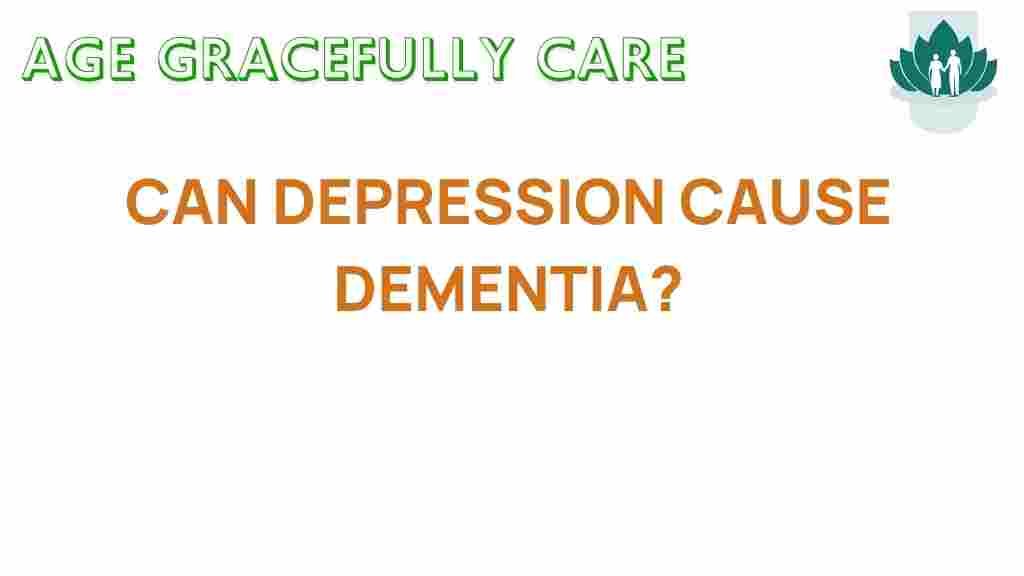Unraveling the Link: Can Depression Trigger Dementia?
In recent years, the relationship between depression and dementia has garnered increasing attention from the scientific community and the general public alike. With the growing prevalence of mental health issues and cognitive decline, understanding how these conditions interconnect is crucial for improving brain health and developing effective prevention strategies. This article delves into the intricate link between depression and dementia, exploring how mood disorders can influence the risk of developing neurodegenerative diseases such as Alzheimer’s.
The Connection Between Depression and Dementia
Research indicates that individuals experiencing chronic depression may be at a higher risk of developing various forms of dementia, including Alzheimer’s disease. This section will explore the mechanisms that may underlie this connection.
- Biological Changes: Depression can cause alterations in brain structure and function, potentially contributing to cognitive decline. Neurotransmitter imbalances, inflammation, and hormonal changes often accompany depression, which may impact brain health over time.
- Increased Stress: Chronic stress related to mood disorders can lead to elevated cortisol levels, which have been associated with hippocampal atrophy and memory impairment.
- Lifestyle Factors: Individuals with depression may engage in unhealthy behaviors such as poor diet, lack of exercise, and social withdrawal, all of which can negatively impact cognitive function.
Understanding Cognitive Decline
Cognitive decline refers to a gradual loss of cognitive abilities, including memory, attention, and reasoning skills. It is essential to distinguish between normal age-related changes and pathological conditions like dementia. Here are some key points to consider:
- Normal Aging vs. Dementia: While some cognitive decline is expected with aging, dementia represents a significant deterioration in mental functioning that interferes with daily life.
- Signs of Dementia: Common symptoms include memory loss, difficulty in communication, impaired reasoning, and changes in mood and behavior.
Types of Dementia Linked to Depression
Several types of dementia have been linked to depression, each characterized by unique symptoms and underlying pathology:
- Alzheimer’s Disease: The most common form of dementia, Alzheimer’s is associated with memory loss and cognitive decline. Studies suggest that depression may increase the risk of developing Alzheimer’s, possibly due to shared biological pathways.
- Vascular Dementia: This type results from reduced blood flow to the brain, often due to strokes. Depression is common among individuals with vascular dementia, creating a vicious cycle of cognitive impairment and mood disorders.
- Frontotemporal Dementia: Characterized by changes in personality and behavior, this type of dementia may also be influenced by mood disorders, although the exact relationship is still being studied.
Risk Factors for Depression and Dementia
Understanding the risk factors associated with both depression and dementia can help identify individuals who may be at greater risk. Here are some common risk factors:
- Age: The risk of both conditions increases with age, particularly in individuals over 65.
- Genetics: A family history of depression or dementia can increase susceptibility.
- Chronic Illness: Conditions such as heart disease, diabetes, and stroke can contribute to both mood disorders and cognitive decline.
- Social Isolation: Loneliness and lack of social support are significant risk factors for depression and may exacerbate cognitive decline.
Step-by-Step Process: How Depression May Influence Dementia Risk
The potential pathway from depression to dementia can be understood through several interconnected steps:
- Onset of Depression: Individuals may begin experiencing symptoms of depression due to various life stressors, chronic illness, or other factors.
- Chronicity of Symptoms: If left untreated, depression can become chronic, leading to sustained periods of low mood and cognitive impairment.
- Impact on Brain Structure: The ongoing effects of depression can lead to neurochemical changes, inflammation, and structural changes in the brain.
- Development of Cognitive Impairment: These brain changes may manifest as memory loss and other cognitive deficits, raising the risk for developing dementia.
Troubleshooting Tips for Managing Depression and Reducing Dementia Risk
While the link between depression and dementia is complex, there are proactive steps individuals can take to manage their mental health and potentially mitigate the risk of cognitive decline:
- Seek Professional Help: Engaging with mental health professionals, such as therapists or psychiatrists, can provide effective treatment options for depression.
- Stay Physically Active: Regular exercise has been shown to improve mood and may help protect against cognitive decline.
- Maintain a Healthy Diet: Diets rich in antioxidants, healthy fats, and whole grains can support brain health. Consider following the Mediterranean diet, which has been linked to lower rates of dementia.
- Stay Socially Engaged: Maintaining relationships and social interactions can combat loneliness and contribute to better mental health.
- Challenge Your Brain: Engage in activities that stimulate cognitive function, such as puzzles, reading, or learning new skills.
Conclusion
Understanding the link between depression and dementia is vital for promoting better mental health and preventing cognitive decline. While the relationship between these conditions is still being researched, it is clear that addressing depression early can have significant implications for brain health. By recognizing the risk factors and adopting a proactive approach to mental well-being, individuals can take meaningful steps toward reducing their risk of developing dementia.
For more information on mental health resources, consider visiting MentalHealth.gov. Additionally, if you are interested in learning more about the latest research on cognitive decline, check out this comprehensive guide.
This article is in the category Health and created by AgeGracefullyCare Team
